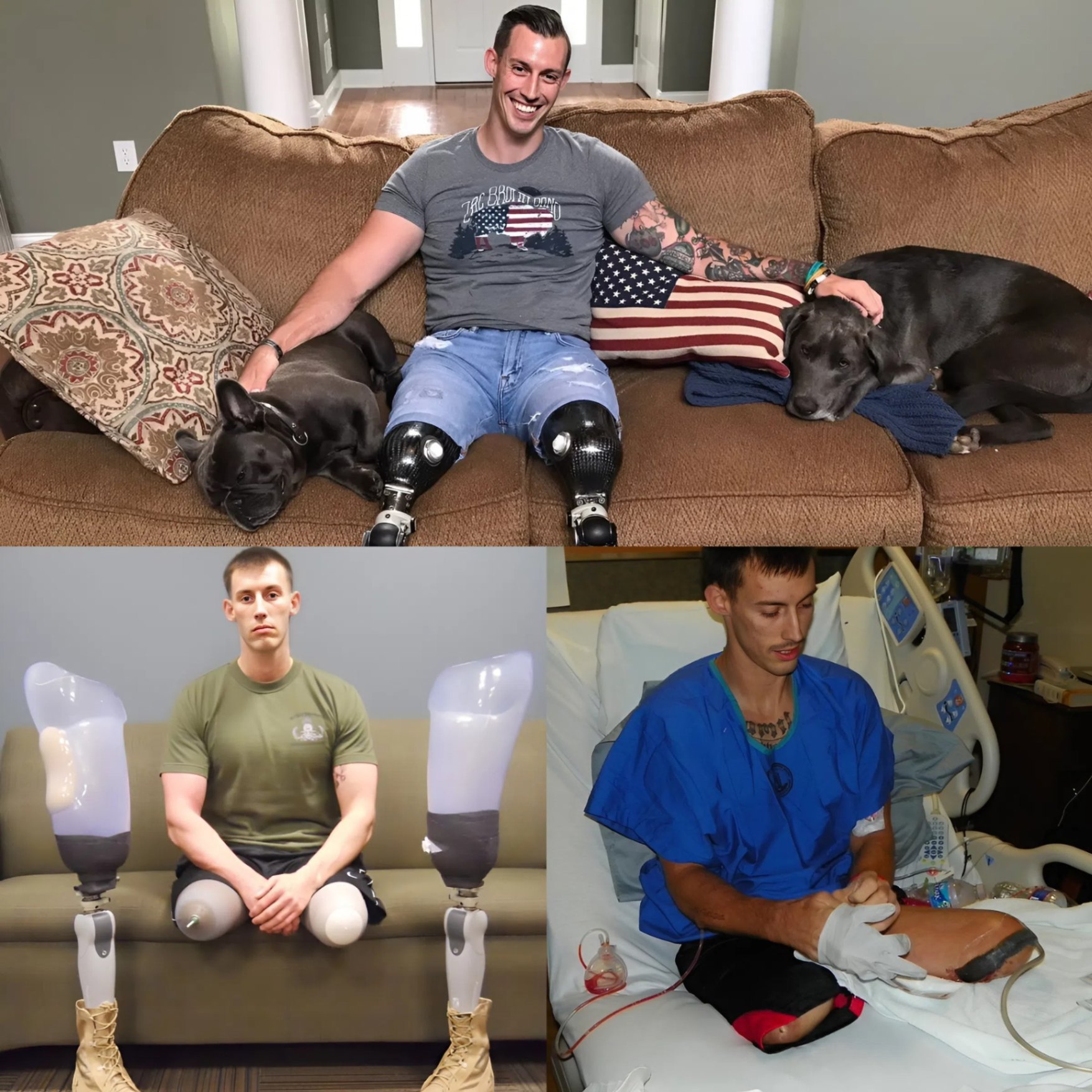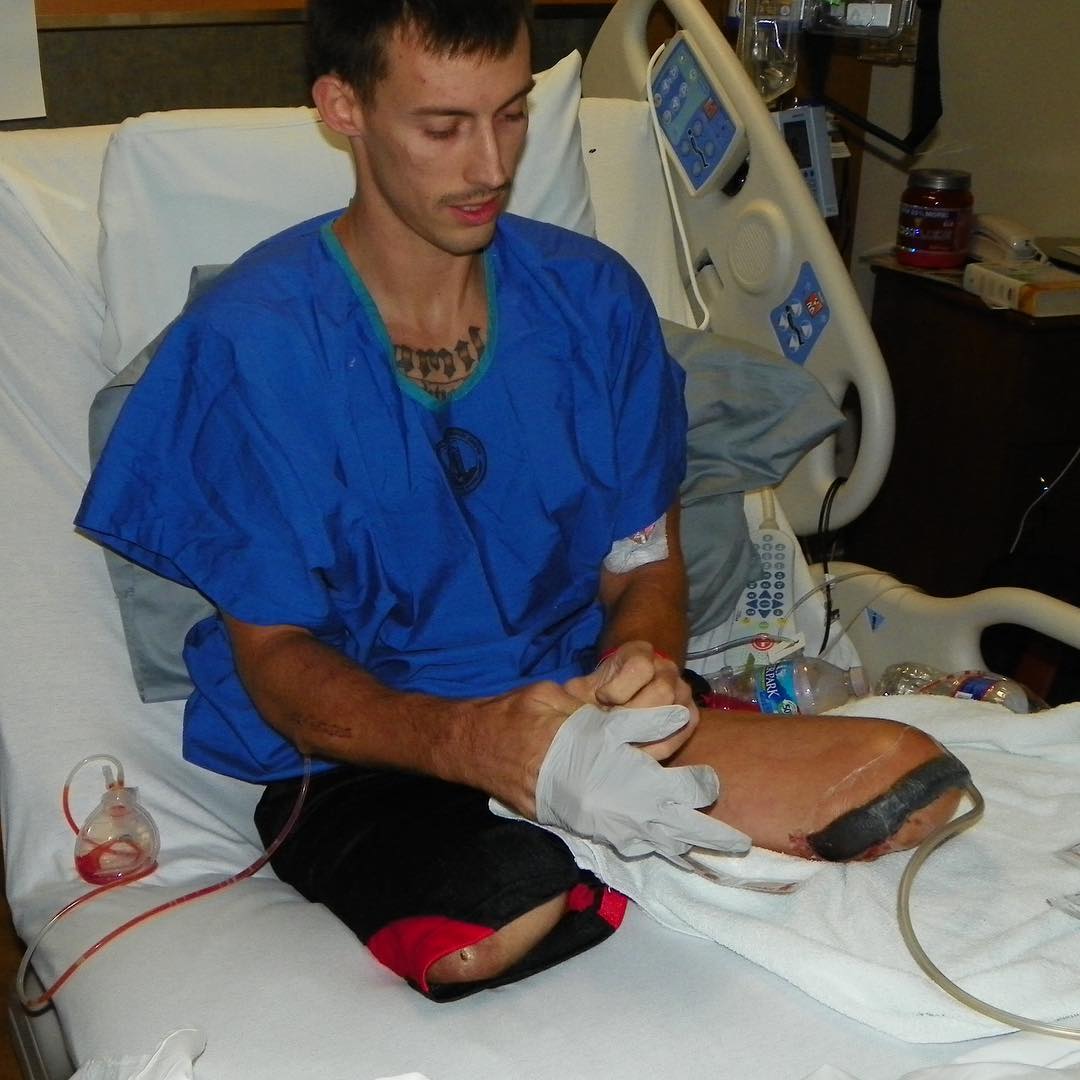On a dusty road in Afghanistan, in the middle of a tense mission, Johnny Joey Jones’ life changed forever. Tasked with clearing an area suspected of hiding deadly explosives, he stepped forward with the steady caution of a seasoned Marine. But in a cruel twist of fate, his foot landed directly on an improvised explosive device (IED).
The explosion was deafening. A wall of fire and smoke ripped through the air, and in an instant, Johnny’s body was hurled to the ground. His legs were shattered beyond repair. Amidst the chaos and unbearable pain, Johnny’s consciousness flickered—but he still heard his comrades shouting his name. Strong hands gripped his own, refusing to let him slip away. That moment, carved in fire and anguish, would become the turning point of his life.
The Agony After the Blast

When the dust settled, Johnny was airlifted out and rushed into surgery. Doctors did everything they could, but the outcome was irreversible: both legs were gone.
Lying in a hospital bed, Johnny confronted a reality more devastating than the battlefield itself. He was only in his twenties, yet stripped of his physical independence. The despair was crushing. Simple questions weighed heavily on his mind: How will I live? Who will I be now?
But it was in that depth of darkness that Johnny discovered a flicker of resilience. Instead of surrendering to hopelessness, he resolved to fight—not against enemies this time, but against despair itself. He once said with profound clarity:
“When I lost my legs, I realized I still had my heart to keep living and to keep loving.”
These words, born of pain, would become a guiding light not just for him, but for thousands who later drew strength from his story.

Choosing Life, Not Pity
Recovery was a long, grueling process. Each day brought its own battles—learning to move, to balance, to accept prosthetics. But Johnny made a deliberate choice: he would not allow pity to define him. Instead, he leaned into humor, camaraderie, and sheer determination.
Fellow veterans recall his stubborn positivity. In the rehabilitation ward, he encouraged others who were equally broken, reminding them that scars were not the end of life but the beginning of a new one. He cracked jokes to lighten the burden, even when his own pain was unbearable.
This attitude—gritty, defiant, and filled with heart—became his trademark. Johnny was not just surviving. He was living.
Becoming a Voice for Veterans
After his recovery, Johnny refused to fade into the background. Instead, he transformed his ordeal into a platform to speak for those who had served and sacrificed. He became an outspoken advocate for veterans, using his story to raise awareness of the struggles they face—not only on the battlefield but long after returning home.
Through public speaking, media appearances, and work with nonprofit organizations, Johnny reminded Americans that the cost of freedom is not abstract. It is measured in lives, limbs, and lasting scars.
His work extended beyond politics or policy—it was deeply personal. He connected with veterans facing amputations, PTSD, and the crushing weight of reintegration into civilian life. Johnny reminded them that brokenness does not mean worthlessness.

A New Mission: Inspiring Millions
Johnny’s courage captured the attention of the nation. As a Fox News contributor and motivational speaker, he reached millions with his authenticity and grit. His voice carried weight not because of polished rhetoric, but because of lived truth.
He often shared that losing his legs gave him a new set of eyes. Instead of dwelling on limitations, he focused on the richness of life that remained—family, friendships, and the ability to impact others. His message was universal: adversity is not the end of your story, but the opening of a new chapter.
“Courage,” he often says, “isn’t about never falling. It’s about getting back up when life knocks you down harder than you ever thought possible.”
Beyond the Uniform
While the Marine uniform defined much of his past, Johnny’s present is just as meaningful. He is a devoted husband and father, embracing family life with the same passion he once brought to the battlefield. His children see not a man limited by prosthetics, but a father who embodies resilience and joy.
He also uses his platform to promote patriotism, community, and kindness. Whether on television, at veterans’ events, or in schools, Johnny stresses that courage is not exclusive to soldiers. Every person, he insists, will face their own “explosions” in life—moments that threaten to shatter them. What matters most is how they choose to respond.
Lessons from Johnny’s Journey
Johnny Joey Jones’ story is not just about war or injury—it is about the universal human capacity to endure and transform suffering into strength. His journey offers profound lessons:
-
Resilience is a choice. Pain is inevitable, but surrender is optional.
-
Purpose fuels healing. By dedicating his life to helping others, Johnny found his own strength.
-
Love outlasts loss. Even when stripped of so much, he held onto the heart that makes life meaningful.
His message is particularly vital in today’s world, where countless people face invisible battles—illness, loss, failure, or despair. Johnny’s example proves that courage is not the absence of suffering, but the determination to live fully in spite of it.
Conclusion: Heart Overcomes All
From that harrowing explosion in Afghanistan to the stages where he now shares his story, Johnny Joey Jones has walked a path few could imagine—though he walks it not with legs, but with unshakable heart.
He lost his limbs, yes. But he kept something greater: a spirit unbroken and a heart overflowing with love for life.
Johnny’s journey reminds us all that courage is not about what we lose, but what we choose to hold onto. And in his case, he held onto the very thing that makes us human—hope, love, and the will to rise again.